Bullet (1996): "My body shall pay recompense"
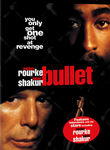
Set on the East Coast, using a starkly realist tone, the direct-to-video Bullet tells the story of the final journey of a what appears to be an irredeemable convict thug. Where Earth Girls was a light and airy comedy-musical with a standard Hollywood ending, Bullet is a dark, morose and at times uncomfortable film with a much less happy ending. However, like Earth Girls, Temple is once again thrust into a situation where he is working with an actor-writer and its hard to tell where the writer's vision ends and Temple's begins. In this case, the writer, Mickey Rourke, couldn't be more different than Valley Girl Julie Brown. Rourke, in perhaps his last leading role, co-wrote this with Bruce Rubenstein, who explains in the featurette that it is based on true events in his life.
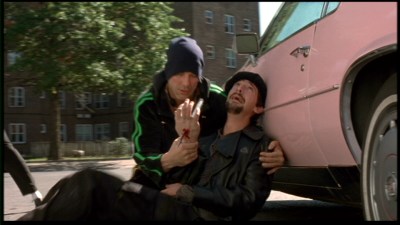 Rourke's film is very much an actor's film, utilizing a talented ensemble that includes a young Adrian Brody as younger brother Ruby, Ted Levine (Buffalo Bill from Silence of the Lambs) as his mentally ill older brother Louis and Tupac Shakur as Tank, Butch's prison nemesis. Rourke plays Butch, an ex-convict who has been in prison for several years and is apparently at the root of the dysfunction of his lower middle-class Jewish (non-practicing) Brooklyn family. Butch was a promising ball player who turned sour when he discovered drugs and whose demand for money to support his habit so terrorized his parents that they slept with their door locked. His older brother, a delusional Veteran who thinks he is still in the special forces, blames Butch for the disintegration of the family and complains that things were better, if they can get better, when Butch was in the slammer. His alcoholic father can't stand to look at his son and fears that he will go back to his old thieving and drugging ways. Ruby, who was 12 when Butch went away, is an aspiring artist who looks up to his brother.
Rourke's film is very much an actor's film, utilizing a talented ensemble that includes a young Adrian Brody as younger brother Ruby, Ted Levine (Buffalo Bill from Silence of the Lambs) as his mentally ill older brother Louis and Tupac Shakur as Tank, Butch's prison nemesis. Rourke plays Butch, an ex-convict who has been in prison for several years and is apparently at the root of the dysfunction of his lower middle-class Jewish (non-practicing) Brooklyn family. Butch was a promising ball player who turned sour when he discovered drugs and whose demand for money to support his habit so terrorized his parents that they slept with their door locked. His older brother, a delusional Veteran who thinks he is still in the special forces, blames Butch for the disintegration of the family and complains that things were better, if they can get better, when Butch was in the slammer. His alcoholic father can't stand to look at his son and fears that he will go back to his old thieving and drugging ways. Ruby, who was 12 when Butch went away, is an aspiring artist who looks up to his brother.
Now Butch is back from prison and is reverting to his old junkie ways. Or is he? The story invokes Sun Tzu at one point.
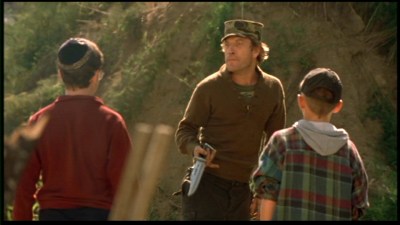 Tzu was famous for his observation that the best warrior uses deception to achieve his goals. Is Butch really back to his old ways or does he have a plan to redeem himself to his family?
Tzu was famous for his observation that the best warrior uses deception to achieve his goals. Is Butch really back to his old ways or does he have a plan to redeem himself to his family?
The story opens up flying over a pastoral Autumn forest with classical music playing in the background. One almost thinks the next scene will be some Merchant and Ivory mansion or a prep school. Instead, we fly into a huge a prison as rap music takes over the soundtrack and float down until we meet Butch. It is his last day in prison and none too soon to judge by the menacing glares he receives from other inmates. As he leaves his cell he tells the officer that he can "bet his ass" that Butch won't be back.
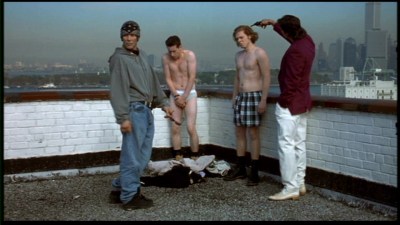 He meets his brother and his best pal Lester, a proto-metrosexual, at the prison gate, gives the place the bird and pulls a bag of heroin of his pocket, "courtesy of the state." He and Lester shoot up while Ruby drives them back into the city. Upon arriving, Lester points out two customers of Tank (Tupac Shakur), rich kids from Long Island whom Butch proceeds to humiliate by stealing their clothes and money. When attacked by one of Tank's minions for messing with their customers, Butch responds by sticking a knife in his eye and tells him to warn Tank that he is back in town. We are certainly led to believe that this is one irredeemable hardened thug.
He meets his brother and his best pal Lester, a proto-metrosexual, at the prison gate, gives the place the bird and pulls a bag of heroin of his pocket, "courtesy of the state." He and Lester shoot up while Ruby drives them back into the city. Upon arriving, Lester points out two customers of Tank (Tupac Shakur), rich kids from Long Island whom Butch proceeds to humiliate by stealing their clothes and money. When attacked by one of Tank's minions for messing with their customers, Butch responds by sticking a knife in his eye and tells him to warn Tank that he is back in town. We are certainly led to believe that this is one irredeemable hardened thug.
But little hints are given that Butch is not what he appears to be. He shoots up alone in his room and flashbacks to prison where he sees danger lurking everywhere. Since the film drops repeated hints that Butch was abused in prison, raped and sodomized, we can guess that the people he sees in the vision are the people who menaced him. We see that his drug addiction is most likely tied to the total loss of his dignity and the hellish time he had in prison. We then see him in his cell looking at one of Ruby's drawings. He later tells Ruby that he should make something of himself using his artistic talent. And its not too much of a stretch to find out that this is his objective -- to redeem himself by saving Ruby from the same life that he led. How he does this is the crux of the film and the central problem. Other than getting us to slowly like this guy Butch, the film really has nowhere to go and meanders for the last hour or so building up to the conclusion where Butch sacrifices himself to save his brother.
This was probably an unfortunate experience for Temple since the movie seems like it was almost dictated by the star in a heavy-handed fashion. There's even a scene where Rourke preaches to some kids in a bathroom not to use drugs. Rourke, who once demanded that there be a scene in Barfly where he looks into the mirror, has a similar scene here -- except this time he smashes the mirror with a golf club. It is a dolorous and masochistic performance -- uncomfortable. Ted Levine's character is also hard to watch. An abusive schizophrenic who pads around the house in soiled underwear and teaches neighborhood kids how to use a knife to slice necks, he has little to do in the movie except serve as Butch's conscience. He has bugged the house and listens to the conversations in his bunker-room providing commentary ("buncha pansies!" when listening to Butch and Lester discuss homosexuality). The only reason I think he is here is to give Butch a bit of an excuse for what would otherwise be thought of as a weakness of character and apparent sociopathy. Like Butch, Louis is not what he seems. Although he claims to be a Marine veteran (he cites action at Lebanon and Vietnam), he sometimes says he was in the 7th Cav (the Army is 7th Cavalry) and other times says he was in "Special Forces." At the end, though, he shows that perhaps he isn't totally delusional and redeems himself by exacting some revenge in Butch's name.
Temple is a background player in this actor's movie - even the music was reportedly dictated by Mickey Rourke (Butch is a laughingly a Barry White fan and Lester, his proto-metrosexual pal, listens to "I'm Too Sexy For My Shirt"). Temple's main influence is through the visuals and the sound. To maintain a constant tension he uses the constant rumbling of the overhead trains. He finds both beauty in watching the trains pass each other and makes a statement of how the world is passing by this drug-torn neighborhood. He releases tension by languishing on the street art and the garish statues in Coney Island.
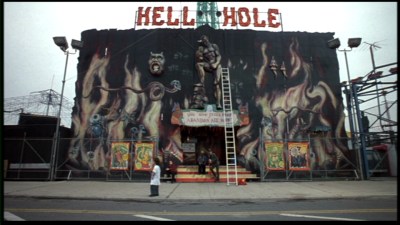 Unfortunately, beyond that, he's just the guy behind the camera. I'm guessing he may have helped Tupac in his acting scenes. Shakur really underplays his character and, as rappers go, was not a bad actor. Still, this was an offbeat choice for Temple -- a stark crime drama set in foreign milieu and he have to give him some props for trying something new.
Unfortunately, beyond that, he's just the guy behind the camera. I'm guessing he may have helped Tupac in his acting scenes. Shakur really underplays his character and, as rappers go, was not a bad actor. Still, this was an offbeat choice for Temple -- a stark crime drama set in foreign milieu and he have to give him some props for trying something new.
Notes: Rourke's own redemption may be at hand as he takes his first leading role since Bullet in the much-anticipated Sin City.

5 Comments:
Hell0, have You ever seen the full soundtrack for this film somewhere?
No there isnt any Soundtrack.
But there is an Unofficial in the Net.
i am looking for the soundtrack as well, if i find it i am going to try to post the link up on here.
Barry White - Never, Never Gonna Give you up
Leck mich um arsch
Post a Comment
<< Home